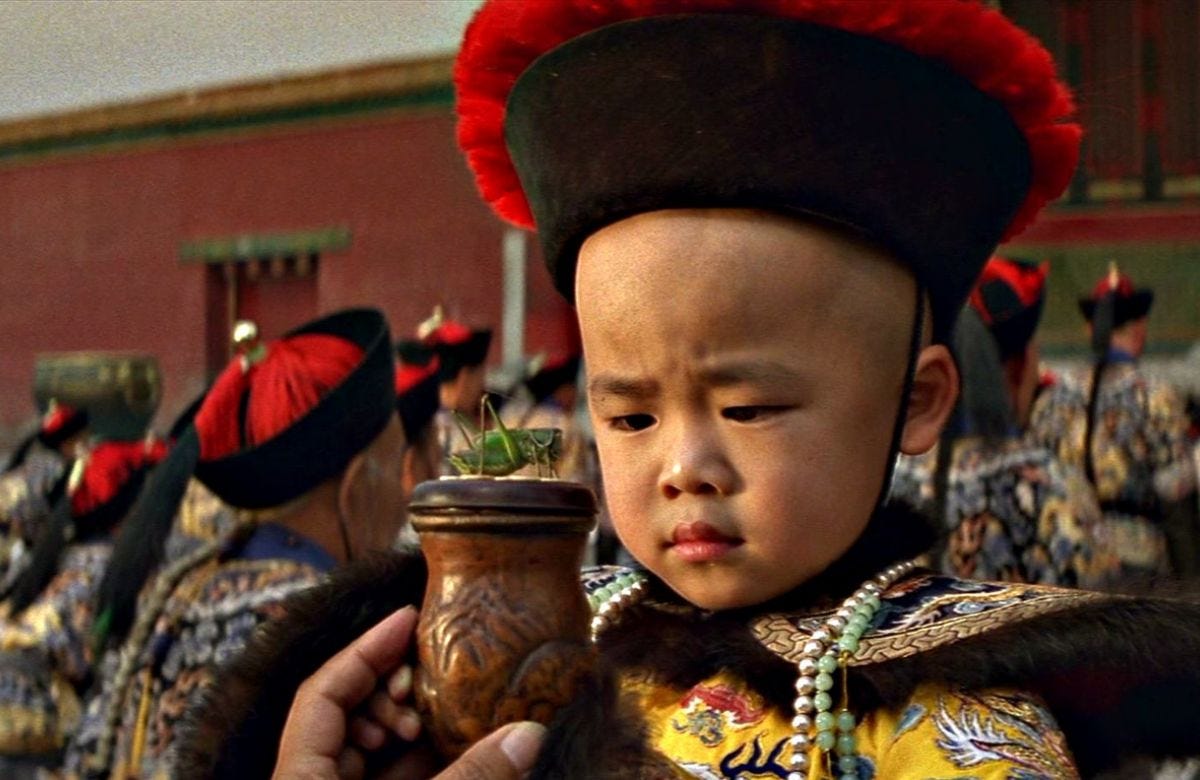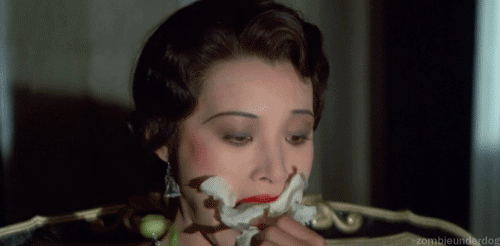To be honest, I am kind of ambivalent about the execution of kings. I do not feel like the French or the Russians were at all in the wrong for wiping out their ruling families wholesale and you will simply never find me doing the kind of Sofia Coppola-inflected girlboss apologia on behalf of any Bourbon or Romanov. Not Marie, not Anastasia. I am just a bitter hag, descended from enough tenant farmers (and not enough landlords) to find monarchist coquettage not particularly appealing.
Yet, on a human level, I think it is repugnant to kill anyone. I don’t think any crime is horrible enough to justify retributive death—and I do mean any. But when you execute a king, it kind of is the self-evident consequence of a brutal system that funnels all of its governance through the body of a single person, one that they call divine. When a person is so powerful, so privileged, as to be godly, to be the law or the state—you are not just killing a king, you are killing a government. And it was the logic of monarchy itself that told you that’s what you were doing.
That’s not what this is about, though. This is about Aisin Gioro Puyi, who did not lose his head and was not shot, who lived through two revolutions (and quite a few coups), two civil wars, two world wars, who was—notably—protected from the Cultural Revolution even though the was the symbol of the feudal Olds, who died in his sixties of cancer and heart disease.
What do you do with a king who no longer has a throne? Do you keep him locked up in the palace, feeding him delusions of his unlimited power? It is like theatre, says a teenaged Puyi in Bernardo Bertolucci’s The Last Emperor, and that is true, isn’t it, of his entire life? That’s true of all royalty, and it’s at the root of my complicated sympathy for them.
There’s a line in Cao Xueqin’s Honglou Meng—你方唱罢我登场1—that’s become a shorthand for this kind of political pageantry. Once you have finished singing, I step onto the stage. We all know it’s a kind of performance, no one thinks it is real, and yet we will do it to keep the show going. A two (almost three) year old is incapable of ruling, yet even if his mental capacity does not allow him to do so, his flesh body is needed for “government” to conduct its affairs. L’etat c’est moi, proclaims Louis XIV, and in his mouth it is a proclamation of his absolute power, but it is also a concession that kings, princes, anyone ennobled by this system, are inhuman because of it. You are the state. Your body is the politic. Even absent a formal, legal monarchy, Puyi must perform this farce. He has no real friends his age, no real relationship with either mother or father, no one around him who can refuse him. He is orphaned by the position that was given to him. His kingship isn’t real, his marriage isn’t real, and he will later be the not-real emperor of an entire not-real country. He cannot leave, even if he wants to. (But does he want to. The answer, I think, is no.) He is just shy of three years old, and the entire world bows at his feet.
Puyi is…complicated. I revile him and his innate belief of being better than and superior to, and at the same time I have tremendous sympathy and sorrow for him, sorrow I am not sure if he ever really would have afforded the likes of me. He never had a chance of a normal life or meaningful relationships, and yet he was afforded the luxury of wealth and comfort as hundreds of millions suffered the consequences of political turmoil brought about by consequence of his failed dynasty. I tweeted while watching The Last Emperor that the story of Puyi felt like one of rehumanisation—of making a person out of a king—but I think, ultimately, the failure of the film itself is that, while it gestures towards this idea, it is never really able to bring its central characters to life in a way that made them feel embodied.
The problem is that, in seeking to make Puyi a protagonist, Bertolucci sands down his rough patches. His emperor is one who is well-meaning but inept, insensitive and entitled but more than anything a fool. Puyi wants to be emperor again but doesn’t know that’s what he wants, and his reformation—through imprisonment—into a humble gardener is not one that is particularly convincing, because I actually do not know whether that is possible. Puyi was protected from the Cultural Revolution. To be fair, he died only a year into a ten year social upheaval, but the premier of the Communist Party of China stepped in to ensure that the former emperor did not bear the brunt of the gluttonous zealotry that even hardline communists who fought in the revolution had to suffer. Such are the luxuries of being symbolic.2 At worst, Bertolucci’s Puyi is unaware. His greatest sin is in not knowing. In trying, but failing. We get a little of his arrogance, his entitlement, his weakness, and there is some exploration of the construction of Chineseness and the way the Republic in particular was founded in anti-Manchu sentiment that could have been interesting to explore. Yet—and this is maybe my own familiarity with the general contours of Puyi’s life and the cultural narratives around him—the real man seemed more tangled, more thorny, more complicated. He could be actively, viciously cruel, in the way of Daisy and Tom Buchanan, in his carelessness. He became religiously fanatical during his tenure in Manchukuo. In crafting a story that is narratively satisfying and conclusive, we get so much less of the ambiguity, the vitality, and the tooth that gives Puyi’s life texture. It is an inherently sensational story—why tone down the contradictions instead of playing them up, giving them air?
This sanding down happens most tragically to Empress Wanrong, who in the cultural imagination is probably closest cognate to the Habsburg archduchess who had her head chopped off. Wanrong was born into a powerful Manchu family under the Plain White Banner, which routinely married its scions into the royal family (both Wanrong and her younger brother Runqi married Aisin Gioro). She was well-educated, lively, and modern, but she also had a famously difficult marriage with her husband, for whom she was chosen not out of any desire of his own but because the adults around him (he was 16) felt her (then 17) to be the most suitable match. She had a thorny relationship with Wenxiu, was frivolous, had a temper, possibly suffered from mental illness and, despite her modern manners and sensibilities and the misery of her marriage, was attached to being empress and the status that came with it. She was said to have been kind and at times donated to charity, but was not an entirely benevolent figure.
I try not to identify with historical figures who would not have cared whether I lived or died, but there is vigour and complexity to Wanrong that I am admittedly moved by. Wenxiu as well—though she, unlike the others, had the strength to walk away. Wanrong’s tragedy is that she was a modern woman in a forward-thinking age who, motivated by a desire for status, was trapped in a loveless feudal marriage. Her tragedy is also that she was a deeply traditional woman in a society that was rapidly abandoning her value system. By contrast, Bertolucci’s depiction is a passively tragic figure. She is sweet, and gentle, and the film’s moral center. She has no problems with Wenxiu. She loves Puyi, even. The utter desolate loneliness and isolation that drove her to self-medicating with cigarettes and opium, that led to her addiction—and eventual death—are played as quiet ennui and dissatisfaction with the breakdown of a previously happy marriage. (Even Wenxiu does not come out of feeling fully-fleshed—the suicidality and abuse that she had to weather during the Tianjin years is nowhere to be found.)
The only scene that really struck me as capturing the emotionality of a full-fleshed personhood is during the Manchukuo coronation when, surrounded by the Japanese dignitaries she loathes and forced to witness the husband who is neglecting her go against her wishes in accepting an empty crown, Joan Chen’s Wanrong throws a tantrum by eating a floral arrangement before toasting Puyi with the traditional long live and stumbling off in an opium-induced haze to find more to smoke. It’s stunning, it’s visceral, it’s utterly sublime. We just never see the emotional logic of this descent in a woman who only scenes before was making plans with her husband to run away to San Francisco, and who is depicted more as the mature model of femininity and less like an impetuous noblewoman.
And while I certainly would not expect a biopic about Puyi to dive with any particular depth into his relative, Yoshiko Kawashima (Aisin Gioro Xianyu / Jin Bihui), her depiction as a depraved hypersexual bisexual temptress who flatly “hates China” is just not as interesting or as tense as the real person whose royalist, restoration-minded father gave her up for adoption at an extremely vulnerable age to her eventual rapist, the man who also groomed her into a Japanese asset. She was most likely genderqueer3, definitely queer in her sexuality, and I’m sure had a complicated relationship to a land that the family she was born into saw themselves as the rightful rulers of, to the new government that took it all away, and to the tradition that both gave her that power and, by dint of the gender she was given at birth and the status of the mother to whom she was born, confined her.
I don’t really expect biopics to sublimate art in service of reality—it is fiction, after all, and what’s more important than factual facsimile is emotional realism. What I am saying of The Last Emperor is that its fictionalisations are not as interesting enough to justify themselves, nor did they give us insights into these characters than would have made the emotional logic coherent. Part of this is because of the film’s structure—it’s told in retrospect, with the framing of Puyi’s confession to the Party cadres—and taken in that view we can see the entire film as an unstable POV as told by one with reasonable motive to emphasise his own helplessness, lack of agency, and contrition. But even with this reading, Bertolucci does not lean in, does not destablise Puyi’s version of events or question his motives, does not introduce any deeper interrogation of Puyi’s character. Puyi’s passivity does not harm the movie, but the director’s passivity does.
The other part of why the film defangs its primary characters is because Bertolucci also seems to have a desire for the narrative as told by Puyi to be true. He wants it to be true that a king can be rehumanised, turned into a citizen. He wants an emperor who can be transformed into a gardener, so he needs to start with a boy who is reform-minded and generally amiable and also has the extremely handsome face of John Lone. I know this is a strange thing to say of a movie that starts with its protagonist attempting suicide and follows him through ten years of labour camp, but the narrative seems to want ease more than it wants life, breath, blood, and I can’t help but wish for the latter. There are more interesting tensions that are hinted at, but they linger just off the page.
What do u do with a former king? Can he truly be neutralised? Bertolucci’s king is, and he finds a measure of freedom in the anonymity of being a normal person. But I think the question is less answerable outside the confines of fiction, in a real world where only Puyi himself knows his heart, and that it is more interesting that way, too.
In the last scene of the film—another of which I am quite fond—a young boy stops Puyi as he approaches the dragon throne—as a tourist, stepping over the stanchion, not as its owner. To prove that he was once the emperor, he produces the box that holds a cricket he had been given as a toddler on his coronation day and gives it to the boy, who opens it. After fifty years of being locked in a cage, the cricket finally emerges. It’s a tremendously beautiful scene, particularly when it is followed by a flood of tourists and a tour guide who glosses over the life of the man we’ve just spent the last two hours following over every vicissitude in just a few sentences.
None of this is to say that I did not enjoy the movie! I was whelmed! Extremely so.
The Last Emperor is the first Western film to be shot inside the old imperial city, and they make very good use of it. The shots are gorgeously composed, and a few images truly took my breath away—the toddler Puyi running out from Taihe Dian to a sea of people kneeling before him, the pre-teen Puyi feeling human touch through a length of fabric—the music is beautiful, and the costumes are just stunning. Bertolucci is a clearly virtuosic director, keeping the pacing tight despite the runtime, while the actors—for the most part—give sensitive, understated performances. It is a perfectly fine film! I just think there is so much potential for it to have been more.
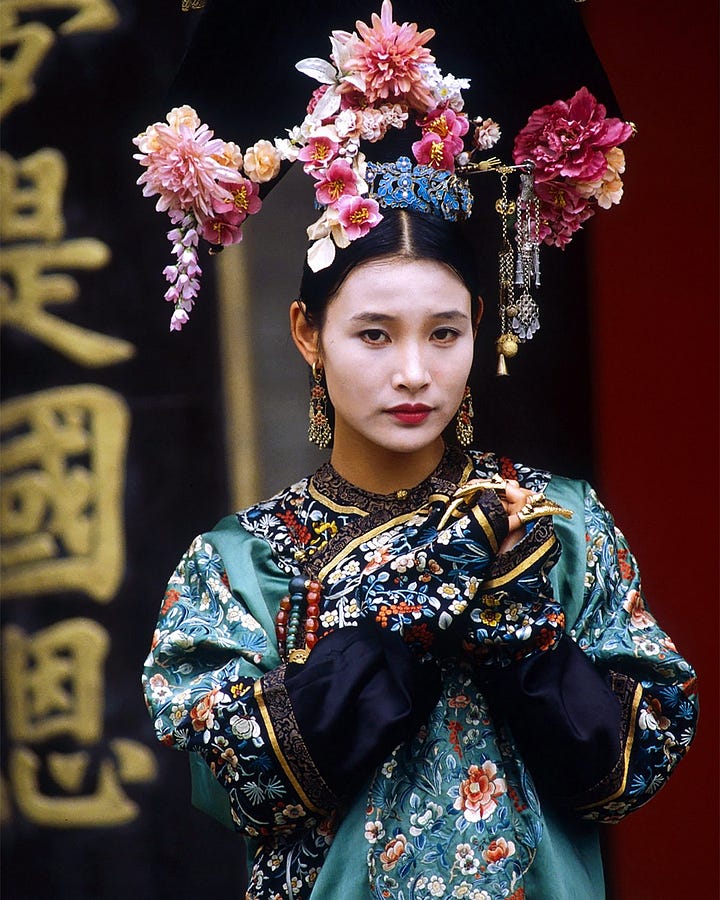
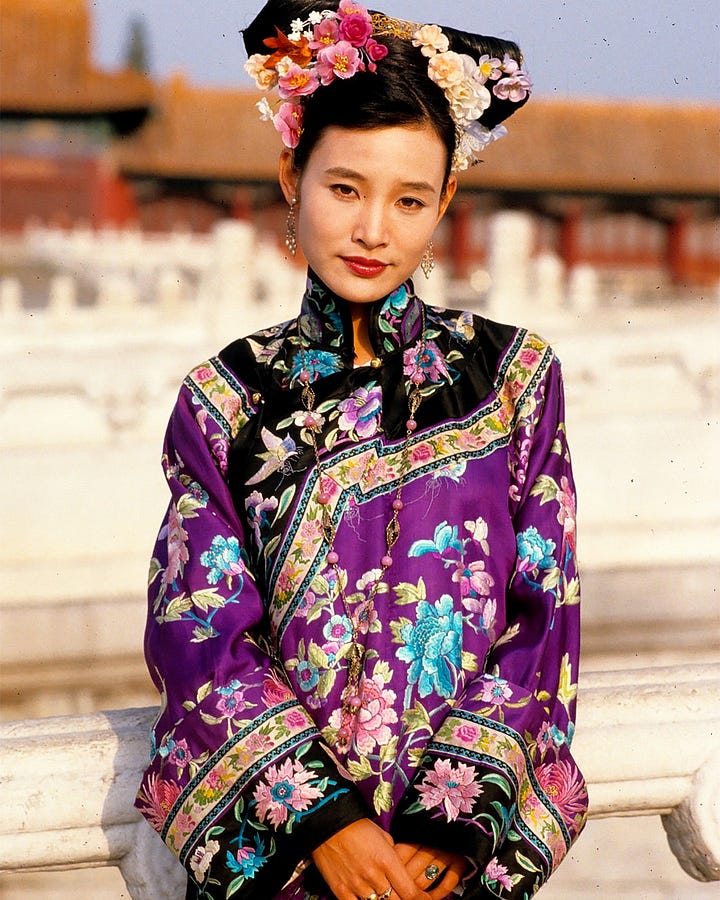
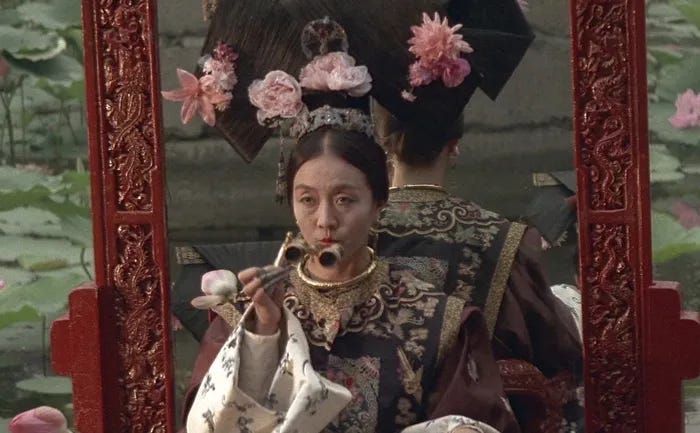
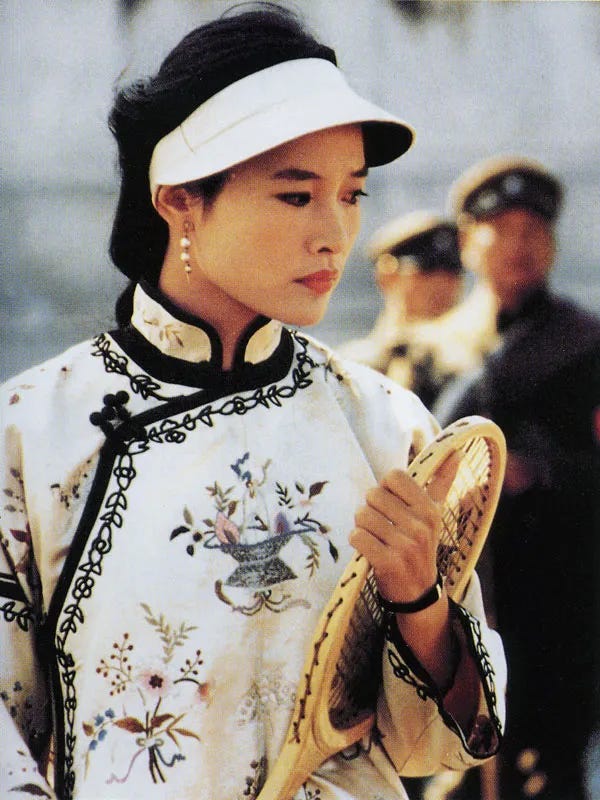
The drama itself was tragically so poorly strung together, but there is a speech in 《九州海上牧云记》 that I think about a lot, when the heir to the throne, Muyun Sheng, says, ““亲者为仇,爱人相杀,当局者明知是戏,却下不来台,旁观者心中暗笑,却盼着登场,这就是皇家,这就是帝王”—[You] turn family into enemies and lovers against each other, the performers know it’s a farce but cannot leave the stage, the onlookers hide their laughter but wait eagerly to step on—[so] these are [your] princes, [so] this is [your] empire.
And it must be said that this is a very deeply ingrained Chinese tradition—to keep the former rulers ennobled in a position of relative aristocratic privilege in order to prevent them from attempting restoration. Puyi’s own family did this with several Ming princes once they’d wiped out the main branch, granting them the title of Marquis of Yan’en—the last of whom followed Puyi to Manchukuo. Deposed royalty is good propaganda that lends legitimacy to your own rule, what can I say.
I’m using she/her pronouns here because that seems to be the standard by which people refer to Yoshiko Kawashima, and I try to be cognizant of not applying our cultural understandings of gender and sexuality onto people whose cultural understandings of the same may differ—but I do want to point out that Kawashima pretty explicitly identifies that she was “born with…a tendency towards the third sex,” used the male style of grammar in Japanese, publicly bid farewell to womanhood and cut off her hair just months after her 18th birthday, routinely dressed in male clothing—and I don’t think it would be unreasonable to speculate that Yoshiko may be viewed as trans or nonbinary by today’s standards. But I also don’t have a particularly deep or thorough understanding of the way Yoshiko related to gender or womanhood or how she navigated either!
